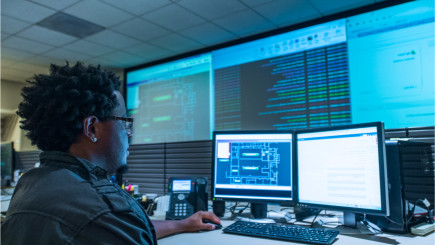
Learn data science: How to get started online
Expand your data science skills and learn data analytics techniques to extract valuable insights and solve real-world problems with online courses and programs on edX.
Browse online Data Science Certificates
Find new interests and advance your career opportunities
Stand out in your field
Use the knowledge and skills you have gained to drive impact at work and grow your career.
Learn at your own pace
On your computer, tablet or phone, online courses make learning flexible to fit your busy life.
Earn a valuable credential
Showcase your key skills and valuable knowledge.
Certificates
Related Topics
Why learn data science online?
Data science remains one of the most in-demand technical skills for career advancers. In an edX survey of 1,000 workers, data analysis and visualization ranked among the top three skills for career advancement, alongside AI and machine learning. A data science course or program can expand your analytical skills and sharpen your knowledge of statistics and mathematics. This can prepare you to address real-world problems across multiple sectors, an invaluable skill in the era of big data when data sets are often too large and complex to fit into the memory of a single computer.
How to start learning data science?

If you're curious about the field or planning a full career shift, here are three steps to guide you on how to get started in data science:
1. Understand what data science is
Get familiar with what data scientists actually do before committing time or money. Understand the kinds of problems they solve, the tools they use, the required knowledge (including advanced math), and the various industries they can work in.
This may help you clarify whether data science fits your interests, goals, and abilities. You can start with edX's data science career hub, which breaks down salary and industry insights, required skills, and potential career paths.
2. Build data science skills with online courses and programs
If you're testing the waters, short online data science courses are a great starting point for developing data science skills. Foundational courses typically cover statistics, data analysis, artificial intelligence, and machine learning fundamentals, Python, R, and SQL programming basics.
If you prefer a more structured educational approach to learning, an online bachelor's degree program in data science may be an option. Career switchers or those looking to advance may find alternative credentials — such as a professional certificate or a MicroMasters® — beneficial for learning data science. If you're already a data scientist and want to advance to leadership roles, consider enrolling in an executive education program.
3. Practice your data science skills regularly
To become a data scientist, practice is essential for developing in-demand, job-ready skills. Focus on building hands-on experience in:
- Programming languages like Python, R, and SQL
- Data visualization tools like Tableau or Power BI
- Machine learning basics
- Statistical analysis
- Data wrangling (cleaning and preparing data)
Building side projects using public datasets, joining online data science communities, and participating in coding challenges may be ways to develop these skills outside the classroom.
Seek opportunities like internships, freelance projects, or capstone experiences within your chosen program to create a strong portfolio.
What to expect from online data science programs?
A typical data science curriculum includes courses in math, statistics, computer modeling, programming, and big data and data science.
These programs will introduce you to a variety of new skills and concepts, including:
- R programming
- Statistical analysis
- Regression analysis
- Data structures
- Neural networks
- Structured Query Language (SQL)
- TensorFlow or other machine learning platforms
- Basic data analysis with Excel
- Data visualization with Tableau or Power BI.
You can also study data engineering concepts or focus on the visualization components of data science via self-paced options. The outcome remains the same regardless of the course of study you choose — you will learn to leverage technology to interpret and predict complex data.
How long does it take to learn data science?
It typically takes 4-7 years to learn data science. Most data science jobs require a bachelor's degree, which will take four years to earn if you study on a full-time schedule. A master's degree in data science typically takes 2-3 years to complete.
Careers in data science: Jobs, salary, and qualifications
Data science jobs exist in many industries, including healthcare, marketing, retail, finance, education, and government. These professionals typically work in an office setting or remotely, either for a company that will use the data or for a third-party organization that is preparing data insights for a client.
Below are some data science careers you may want to explore, including data scientist salary details from the Bureau of Labor Statistics.
Your next steps to learn data science online with edX
Data science is a springboard for learners eager to master big data, develop their analytical skills, and open up multiple career avenues.
Start your data science journey today with edX:
- You can sign up for a data analysis course.
- Grow your analytical skills with a bachelor's degree or a master's degree in data science.
- Become an expert in the field with a data science executive education program.
More opportunities for you to learn
We've added 500+ learning opportunities to create one of the world's most comprehensive free-to-degree online learning platforms.
Frequently asked questions
Last updated June 18, 2025